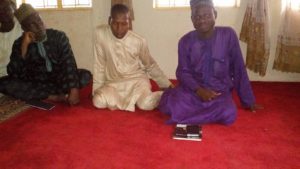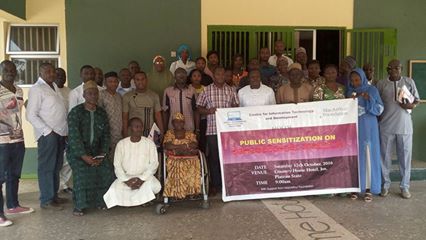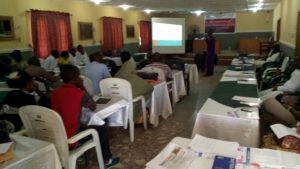Report of Courtesy Visit to JAMA’ATUL NASARUL ISLAM Jos, Plateau State
Following the North Central Sensitization on Hate and Dangerous Speech which took place on 15th October in Jos, on Sunday 16th October, 2016 the Centre for Information Technology and Development (CITAD) which has been monitoring and countering Hate and Dangerous Speeches has paid an advocacy visit to Jama’atul Nasarul Islam (JNI) at its national secretariat in Jos, the Plateau State capital.
The advocacy visit team led by Isah Garba, (Senior Programmes Officer, Peace and Conflict) was received by Umar Faruk Musa, the Public Relations Officer of JNI, after self introduction and welcome remarks Umar expressed happiness for the advocacy and demanded that Mr. Nelson Ananze who is a contact person of CITAD elaborate on the purpose of the visit.
Mr. Nelson Ananze gave a preface about the visiting organization and purpose of the visit, “CITAD is our guest, they came and conducted a programme on Hate and Dangerous Speech and paid courtesy visits to influential people in our communities such as traditional and religious leaders, all in effort to solicit their support towards achieving a sustainable peace, that is why we are here todayâ€. Â
Expatiating, the Hate and Dangerous Speech Project Coordinator of CITAD, Isah Garba said “during the 2015 election we noticed that the percentage of online hate speech went up but after the peace accord by presidential aspirants was signed the level of hate speech came down, but unfortunately after election the online hate speech kept rising again with 97.4% falling within religious domain, and we believed religious leaders and bodies like you have an important role to play by educating people on the danger of violence and significance of peace as well encouraging them to desist from making hate utterances. We particularly want this blessed religious body to also make inputs that will help curb the menaceâ€.
Also commenting, the Vice Chairman of JNI, Alhaji Danjuma Khalil regrets the level hatred being spread on social media which he said is unbecoming, “hate and dangerous speech is a reality and physical thing that circulate on social media or online, that is why I do not register with any social media. The level of abusive language and hatred actually stop me from joining. Jama’atul Nasril Islam will call the attention of all Imams, leaders of all CBOs and their platforms and all preachers to sensitize them on the topic so that they can also preach and sensitize against hate and dangerous speech. We are going to organize seminars for all our members on the topic and if there is need for you to be engaged we will contact you about itâ€, Danjuma Khalil added.
Also making input during the advocacy visit, Deputy Secretary Youth Group of JNI, Alhaji Garzali said Jos has suffered a lot from conflict which has stagnated development and displaced people, therefore any effort to boost peace of whatever kind will be warmly embraced by JNI, and social media now attracts mostly young people who need to be couched on how they can maintain lasting peace, therefore this course will have the maximum cooperation of all. Â Garzali further added that the point on social media followers is funny, most of them are not after what is posted but who posted it, if you follow the comments you will notice that there is clear division into two categories, that is supporting and opposing, both categories are made based on tribe, religion, ethnicity or political party of the person who made the post. Â He asked a question: if you come across hate speech, what are you supposed to do?
Isah Garba responded with relevant example of categories of hate speeches and urged the inquirer to counter by politely advising the speech maker to stop it. As part of their support to curb hate speeches, Garba urged all the imams and preachers to create accounts on social media so that they get to know what is happening and will be able to make vital inputs that will eventually reduce the quantity of hate speeches circulated online because of the wisdom and knowledge they have. He cited a reference to Amir of Kazaure who is now functional and even has a Facebook group.
The advocacy team of CITAD included Isah Garba, Abubakar Yusuf Auyo, Ibrahim Nuhu, Mr. Nelson Ananze, Zahra Yunusa Yau and Shazali Sunusi Sulaiman.




